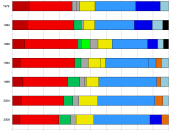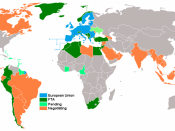Precedents and Present Events in the European Union: An Institutional Perspective an Treaty Reform:
The article:
-about the 1996-7 intergovernmental conference (IGC)
-shows the organizational factors
-facilitates institutional reforms
-challenges the liberal intergovernmental perspective
The IGC:
-IGC is a conference where representatives of the member states consider amendments to treaties
-Outcome must be agreed upon unanimously and ratified by all member states
-The 1996-7 IGC was formally opened in March 1996 during the Italian presidency
-Formal conference negotiations lasted for 15 months
-Initial draft was first agreed upon in Amsterdam during the Dutch presidency
-Final version of the Amsterdam treaty, as it was named, was signed in October 1997
Three main theories (for explaining the driving mechanism of European integration)
1.liberal intergovernmental perspective: argues that the dynamic of European integration is primarily a result of negotiations between the most powerful member states in key bargaining situations
2.supranational approach: argues that transformation of the legal system in Europe is the key motor of European integration
3.multilevel governance approach: argues that the main driving forces are the day-to-day processes of negotiation, competition, and co-operation within and between networks at multiple levels of governance
-These three approaches highlight different mechanisms (bargaining, rule-following, problem-solving)
-They emphasize the importance of different actors (the national governments, The European Court of Justice (ECJ) and the different multilevel networks)
Two theories of Institutional Change
Changes in organizations are characterized by:
-small steps
-incremental modifications
However: institutional design in a democratic context is difficult!
The theories:
1.liberal intergovernmentalism (LI) is overly optimistic (Sverdrup)è
LI assumes that member states are able to design institutions which ensure effective implementation of political decisions; this perspective is based upon three premises:
-states action reflects the bounded rational action of national governments
-the policy objectives of the member states ate not stable...


